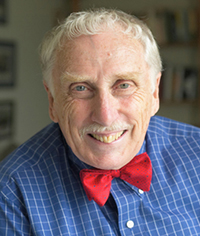By Robert Dilday
James M. Dunn, one of Baptists’ most well-known advocates for religious liberty and separation of church and state, died July 4 a few weeks after his 83rd birthday in Winston-Salem, N.C.
During his nearly two decades as executive director of the Baptist Joint Committee for Religious Liberty, and for 12 years prior to that as executive director of the Texas Baptist Christian Life Commission, Dunn’s colorful rhetoric and take-no-prisoners approach in defense of liberty earned him the reverence and fury of Baptists across the theological spectrum.
 In retirement his commitments remained undiminished while teaching in the Wake Forest University School of Divinity and in innumerable speaking engagements around the country.
In retirement his commitments remained undiminished while teaching in the Wake Forest University School of Divinity and in innumerable speaking engagements around the country.
As head of the BJC from 1981 to 1999, Dunn strongly opposed state-sponsored prayer in public schools and federal vouchers for religious schools. That position put him at odds with the Southern Baptist Convention, then one of several Baptist denominations which funded the Washington-based advocacy group.
Eventually the SBC withdrew its support. But Dunn’s robust leadership positioned the BJC to become one of the most respected voices on religious liberty in the nation’s capital. It was a key player in the passage of the Equal Access Act in 1984 and the Religious Freedom Restoration Act in 1993.
Brent Walker, who succeeded Dunn as the BJC’s executive director in 1999, said he was “heartbroken” by news of Dunn’s death.
“James was my mentor, colleague and friend. I stand in his shoes and on his shoulders every day. We are all impoverished by his death, but heaven is enriched. How fitting that he died — like fellow freedom advocates Thomas Jefferson and John Adams — on the Fourth of July.”
“Words fail to describe his contribution to life, learning and gospel,” said Wake Forest Divinity School professor and close colleague Bill Leonard on his Facebook page. “James called himself a ‘Texas-bred, Spirit-led, Bible-teaching, revival-preaching, recovering Southern Baptist.’”
A native of Texas, Dunn was born June 17, 1932, in Fort Worth. After graduating from Texas Wesleyan College there, he earned bachelor of divinity and doctor of theology degrees from Southwestern Baptist Theological Seminary, also in Fort Worth.
His wife, the former Marilyn McNeely, was the daughter of professors at the seminary. But Dunn had known her since he was 8 and Marilyn was 6. In high school, the two played in the same symphony orchestra — Marilyn on the violin and Dunn on the clarinet. They began dating in 1954 when Marilyn was a student at Baylor University in Waco, Texas, and eventually married. Marilyn became an accomplished vocalist.
After graduating from Southwestern and stints as a pastor, a campus minister and college teacher, Dunn became executive director of the Christian Life Commission, the social action agency of the Baptist General Convention of Texas. In that role he tackled issues ranging from juvenile justice reform to environmental protection to equal rights for women and minorities.
When Dunn was named executive director of the Baptist Joint Committee in 1980, the Southern Baptist Convention — then the largest contributor to the BJC — was beginning a decade-long shift to the theological right, just as the country was moving in the same direction with the election of Ronald Reagan as president.
Unfazed, Dunn aggressively opposed projects endorsed by the Religious Right, including state-sponsored prayer in public schools, at one point famously charging President Reagan with “demagoguery” and playing “petty politics with prayer.”
Beginning in the mid-1980s Southern Baptist leaders repeatedly criticized Dunn’s positions, but he refused to compromise his principles for what he called “a mess of politically tainted pottage.” By 1991 the SBC had withdrawn all funding for the Baptist Joint Committee.
But Dunn’s targets were bipartisan. When Vice President Al Gore backed federal funding for faith-based groups during his presidential campaign in 1999, Dunn penned an open letter to his long-time friend, said Aaron Weaver, a Baptist journalist and author of James Dunn and Soul Freedom, in a 2011 introduction of Dunn at an awards ceremony.
“Dear Mr. Vice President,” wrote Dunn. “I know you. I like you. You mean well. But this time, as we say in Tennessee and Texas, you’ve ripped your britches.”
After retiring from the BJC in 1999, the Dunns moved to Winston-Salem, where he became professor of Christianity and public policy at Wake Forest’s Divinity School. He also served as president of the Baptist Joint Committee Endowment.
In 2011 Wake Forest established the James and Marilyn Dunn Chair of Baptist Studies in the Divinity School. A collection of Dunn’s papers from 1949 to 2010 is housed at the Z. Smith Reynolds Library at Wake Forest. It includes articles and essays written by Dunn, as well as personal letters addressed to Dunn from U.S. presidents Jimmy Carter and Bill Clinton.
Dunn is survived by his wife. A memorial service will be at 11 a.m. on Saturday, July 18, at Knollwood Baptist Church in Winston-Salem, were he was a member.
